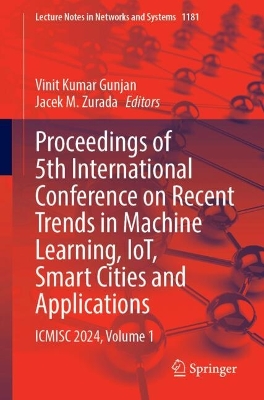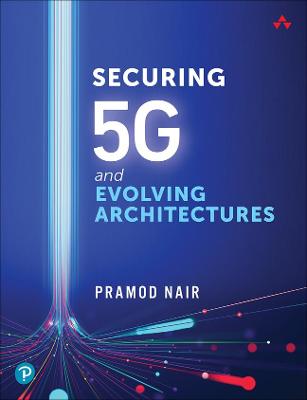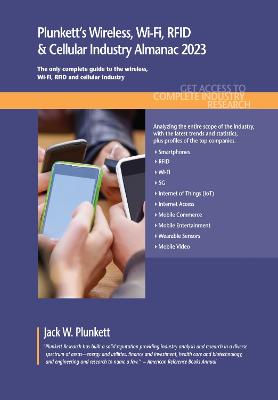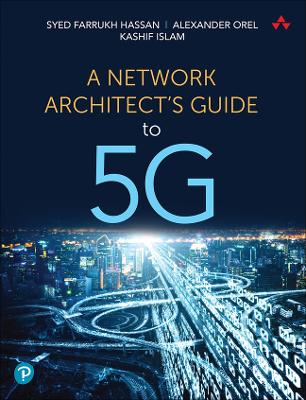Understanding and Troubleshooting Cisco Catalyst 9800 Series Wireless Controllers
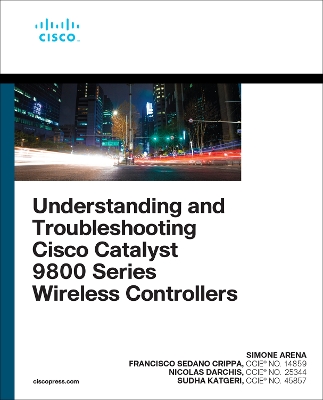 portes grátis
portes grátis
Understanding and Troubleshooting Cisco Catalyst 9800 Series Wireless Controllers
Crippa, Francisco; Arena, Simone; Darchis, Nicolas; Katgeri, Sudha
Pearson Education (US)
08/2022
656
Mole
Inglês
9780137492329
15 a 20 dias
1090
Descrição não disponível.
Introduction xxvii
Chapter 1 Cisco C9800 Series 1
Why Cisco C9800? 2
The Role of the Wireless Controller in a Cloud Era 7
Managing the Cisco C9800 10
Cisco Next-Generation Wireless Stack 22
Summary 23
References 23
Chapter 2 Hardware and Software Architecture of the C9800 25
General CAPWAP Split MAC Architecture 25
The Controller Control Plane Architecture Elasticity 27
Wireless Client State Machine 31
One Dataplane to Rule Them All (or Three at the Maximum) 35
Hardware Overview 38
Summary 42
Chapter 3 C9800 Configuration Model 43
C9800 New Configuration Model 43
Cisco C9800 Series Profile and Tag Considerations 48
Summary 64
References 64
Chapter 4 C9800 Deployment and Installation 65
C9800 Deployment Models 65
Setting Up Your First Catalyst Wireless Network 79
Summary 87
References 87
Chapter 5 Security 89
Network Security Fundamentals 89
Wireless Security Fundamentals 116
Securing the Air 128
Securing Your Access Points 148
Securing Your Wireless Controller 151
Encrypted Traffic Analytics 154
Cisco Umbrella 155
Cisco Secure Development Lifecycle (CSDL) 157
Summary 157
References 157
Chapter 6 Mobility and Client Roaming 159
802.11 Roaming 160
Types of Client Roaming 181
C9800 to AireOS Inter-Release Controller Mobility (IRCM) 191
Summary 192
References 193
Chapter 7 RF Deployment and Guidelines 195
Radio Resources Management (RRM) Concepts and Components 195
Challenging RF Environments 199
Radio Resources Management (RRM) 203
DCA 211
RF Profiles 215
Spectrum Intelligence and CleanAir 219
Advanced RF Features 224
Airtime Fairness (ATF) 228
Dynamic Frequency Selection (DFS) 232
Flexible Radio Assignment (FRA) 235
Wireless Intrusion Prevention System (WIPS) and Rogue Detection 238
Summary 246
References 246
Chapter 8 Multicast and Multicast Domain Name System (mDNS) 247
Wireless Multicast 250
Media Stream Feature 263
mDNS 272
Summary 283
References 283
Chapter 9 Quality of Service (QoS) 285
Wi-Fi Quality of Service (QoS) 286
Wi-Fi (802.11) QoS Fundamentals 287
Implementing Wireless QoS on the C9800 300
Designing and Deploying Catalyst C9800 QoS 304
Best Practices 320
Summary 322
References 322
Chapter 10 C9800 High Availability 323
SSO Redundancy 324
HA Teardown 349
SSO Deployment: Impact on Features 350
N+1 Redundancy 352
N+1 vs. SSO High Availability 357
HA in EWC-AP Deployment 358
HA in EWC-SW Deployment 359
Summary 359
References 360
Chapter 11 Cisco DNA Spaces Integration and IoT 361
Value-Added Wireless Services 361
Connected Mobile Experiences (CMX) 372
Cisco DNA Spaces 372
Specific Service Examples 379
Summary 392
References 392
Chapter 12 Network Programmability 393
What Is Network Programmability? 393
Why Is Network Programmability Needed? 393
Is Network Programmability a New Concept? 396
Orchestration of the Entire Network 396
Configuration Repeatability 396
Idempotency 397
Imperative vs. Declarative Models 397
Infrastructure as Code (IaC) 400
Network Programmability in the C9800 401
Data Models 402
YANG Data Models 403
Encoding Formats 406
Protocols 408
Tools to Examine YANG Models 412
How to Examine Data Using NETCONF and YANG Suite 419
How to Examine Data Using RESTCONF and POSTMAN 421
Python and Network Programmability 429
Summary 436
References 436
Chapter 13 Model-Driven Telemetry 437
What Is Model-Driven Telemetry? 437
How to Enable Model-Driven Telemetry 438
Operational Data and KPIs 441
Polling vs. Subscribing 447
Telemetry Streams 448
How to Identify Subtrees in YANG Models 449
Dial-out vs. Dial-in 450
Tools 460
Summary 467
References 467
Chapter 14 Cisco DNA Center/Assurance Integration 469
Introduction 469
Managing the C9800 with Cisco DNA Center 472
Summary 492
References 492
Chapter 15 Backing Up, Restoring, and Upgrading Your C9800 493
Saving and Restoring the Configuration for Disaster Recovery 493
Running IOS-XE in Install or Bundle Mode 500
Upgrading (and Downgrading) the Controller Safely 501
Summary 506
References 506
Chapter 16 Troubleshooting 507
Control Plane Tracing 509
Embedded Packet Capture (EPC) 525
Packet Tracer 531
Troubleshooting Dashboard 536
Other On-the-Box Tools on the C9800 GUI 540
Offline Tools for the C9800 545
Health and KPI Monitoring 548
Summary 577
References 578
Appendix A Setting Up a Development Environment 579
9780137492329, TOC, 5/27/2022
Chapter 1 Cisco C9800 Series 1
Why Cisco C9800? 2
The Role of the Wireless Controller in a Cloud Era 7
Managing the Cisco C9800 10
Cisco Next-Generation Wireless Stack 22
Summary 23
References 23
Chapter 2 Hardware and Software Architecture of the C9800 25
General CAPWAP Split MAC Architecture 25
The Controller Control Plane Architecture Elasticity 27
Wireless Client State Machine 31
One Dataplane to Rule Them All (or Three at the Maximum) 35
Hardware Overview 38
Summary 42
Chapter 3 C9800 Configuration Model 43
C9800 New Configuration Model 43
Cisco C9800 Series Profile and Tag Considerations 48
Summary 64
References 64
Chapter 4 C9800 Deployment and Installation 65
C9800 Deployment Models 65
Setting Up Your First Catalyst Wireless Network 79
Summary 87
References 87
Chapter 5 Security 89
Network Security Fundamentals 89
Wireless Security Fundamentals 116
Securing the Air 128
Securing Your Access Points 148
Securing Your Wireless Controller 151
Encrypted Traffic Analytics 154
Cisco Umbrella 155
Cisco Secure Development Lifecycle (CSDL) 157
Summary 157
References 157
Chapter 6 Mobility and Client Roaming 159
802.11 Roaming 160
Types of Client Roaming 181
C9800 to AireOS Inter-Release Controller Mobility (IRCM) 191
Summary 192
References 193
Chapter 7 RF Deployment and Guidelines 195
Radio Resources Management (RRM) Concepts and Components 195
Challenging RF Environments 199
Radio Resources Management (RRM) 203
DCA 211
RF Profiles 215
Spectrum Intelligence and CleanAir 219
Advanced RF Features 224
Airtime Fairness (ATF) 228
Dynamic Frequency Selection (DFS) 232
Flexible Radio Assignment (FRA) 235
Wireless Intrusion Prevention System (WIPS) and Rogue Detection 238
Summary 246
References 246
Chapter 8 Multicast and Multicast Domain Name System (mDNS) 247
Wireless Multicast 250
Media Stream Feature 263
mDNS 272
Summary 283
References 283
Chapter 9 Quality of Service (QoS) 285
Wi-Fi Quality of Service (QoS) 286
Wi-Fi (802.11) QoS Fundamentals 287
Implementing Wireless QoS on the C9800 300
Designing and Deploying Catalyst C9800 QoS 304
Best Practices 320
Summary 322
References 322
Chapter 10 C9800 High Availability 323
SSO Redundancy 324
HA Teardown 349
SSO Deployment: Impact on Features 350
N+1 Redundancy 352
N+1 vs. SSO High Availability 357
HA in EWC-AP Deployment 358
HA in EWC-SW Deployment 359
Summary 359
References 360
Chapter 11 Cisco DNA Spaces Integration and IoT 361
Value-Added Wireless Services 361
Connected Mobile Experiences (CMX) 372
Cisco DNA Spaces 372
Specific Service Examples 379
Summary 392
References 392
Chapter 12 Network Programmability 393
What Is Network Programmability? 393
Why Is Network Programmability Needed? 393
Is Network Programmability a New Concept? 396
Orchestration of the Entire Network 396
Configuration Repeatability 396
Idempotency 397
Imperative vs. Declarative Models 397
Infrastructure as Code (IaC) 400
Network Programmability in the C9800 401
Data Models 402
YANG Data Models 403
Encoding Formats 406
Protocols 408
Tools to Examine YANG Models 412
How to Examine Data Using NETCONF and YANG Suite 419
How to Examine Data Using RESTCONF and POSTMAN 421
Python and Network Programmability 429
Summary 436
References 436
Chapter 13 Model-Driven Telemetry 437
What Is Model-Driven Telemetry? 437
How to Enable Model-Driven Telemetry 438
Operational Data and KPIs 441
Polling vs. Subscribing 447
Telemetry Streams 448
How to Identify Subtrees in YANG Models 449
Dial-out vs. Dial-in 450
Tools 460
Summary 467
References 467
Chapter 14 Cisco DNA Center/Assurance Integration 469
Introduction 469
Managing the C9800 with Cisco DNA Center 472
Summary 492
References 492
Chapter 15 Backing Up, Restoring, and Upgrading Your C9800 493
Saving and Restoring the Configuration for Disaster Recovery 493
Running IOS-XE in Install or Bundle Mode 500
Upgrading (and Downgrading) the Controller Safely 501
Summary 506
References 506
Chapter 16 Troubleshooting 507
Control Plane Tracing 509
Embedded Packet Capture (EPC) 525
Packet Tracer 531
Troubleshooting Dashboard 536
Other On-the-Box Tools on the C9800 GUI 540
Offline Tools for the C9800 545
Health and KPI Monitoring 548
Summary 577
References 578
Appendix A Setting Up a Development Environment 579
9780137492329, TOC, 5/27/2022
Este título pertence ao(s) assunto(s) indicados(s). Para ver outros títulos clique no assunto desejado.
Introduction xxvii
Chapter 1 Cisco C9800 Series 1
Why Cisco C9800? 2
The Role of the Wireless Controller in a Cloud Era 7
Managing the Cisco C9800 10
Cisco Next-Generation Wireless Stack 22
Summary 23
References 23
Chapter 2 Hardware and Software Architecture of the C9800 25
General CAPWAP Split MAC Architecture 25
The Controller Control Plane Architecture Elasticity 27
Wireless Client State Machine 31
One Dataplane to Rule Them All (or Three at the Maximum) 35
Hardware Overview 38
Summary 42
Chapter 3 C9800 Configuration Model 43
C9800 New Configuration Model 43
Cisco C9800 Series Profile and Tag Considerations 48
Summary 64
References 64
Chapter 4 C9800 Deployment and Installation 65
C9800 Deployment Models 65
Setting Up Your First Catalyst Wireless Network 79
Summary 87
References 87
Chapter 5 Security 89
Network Security Fundamentals 89
Wireless Security Fundamentals 116
Securing the Air 128
Securing Your Access Points 148
Securing Your Wireless Controller 151
Encrypted Traffic Analytics 154
Cisco Umbrella 155
Cisco Secure Development Lifecycle (CSDL) 157
Summary 157
References 157
Chapter 6 Mobility and Client Roaming 159
802.11 Roaming 160
Types of Client Roaming 181
C9800 to AireOS Inter-Release Controller Mobility (IRCM) 191
Summary 192
References 193
Chapter 7 RF Deployment and Guidelines 195
Radio Resources Management (RRM) Concepts and Components 195
Challenging RF Environments 199
Radio Resources Management (RRM) 203
DCA 211
RF Profiles 215
Spectrum Intelligence and CleanAir 219
Advanced RF Features 224
Airtime Fairness (ATF) 228
Dynamic Frequency Selection (DFS) 232
Flexible Radio Assignment (FRA) 235
Wireless Intrusion Prevention System (WIPS) and Rogue Detection 238
Summary 246
References 246
Chapter 8 Multicast and Multicast Domain Name System (mDNS) 247
Wireless Multicast 250
Media Stream Feature 263
mDNS 272
Summary 283
References 283
Chapter 9 Quality of Service (QoS) 285
Wi-Fi Quality of Service (QoS) 286
Wi-Fi (802.11) QoS Fundamentals 287
Implementing Wireless QoS on the C9800 300
Designing and Deploying Catalyst C9800 QoS 304
Best Practices 320
Summary 322
References 322
Chapter 10 C9800 High Availability 323
SSO Redundancy 324
HA Teardown 349
SSO Deployment: Impact on Features 350
N+1 Redundancy 352
N+1 vs. SSO High Availability 357
HA in EWC-AP Deployment 358
HA in EWC-SW Deployment 359
Summary 359
References 360
Chapter 11 Cisco DNA Spaces Integration and IoT 361
Value-Added Wireless Services 361
Connected Mobile Experiences (CMX) 372
Cisco DNA Spaces 372
Specific Service Examples 379
Summary 392
References 392
Chapter 12 Network Programmability 393
What Is Network Programmability? 393
Why Is Network Programmability Needed? 393
Is Network Programmability a New Concept? 396
Orchestration of the Entire Network 396
Configuration Repeatability 396
Idempotency 397
Imperative vs. Declarative Models 397
Infrastructure as Code (IaC) 400
Network Programmability in the C9800 401
Data Models 402
YANG Data Models 403
Encoding Formats 406
Protocols 408
Tools to Examine YANG Models 412
How to Examine Data Using NETCONF and YANG Suite 419
How to Examine Data Using RESTCONF and POSTMAN 421
Python and Network Programmability 429
Summary 436
References 436
Chapter 13 Model-Driven Telemetry 437
What Is Model-Driven Telemetry? 437
How to Enable Model-Driven Telemetry 438
Operational Data and KPIs 441
Polling vs. Subscribing 447
Telemetry Streams 448
How to Identify Subtrees in YANG Models 449
Dial-out vs. Dial-in 450
Tools 460
Summary 467
References 467
Chapter 14 Cisco DNA Center/Assurance Integration 469
Introduction 469
Managing the C9800 with Cisco DNA Center 472
Summary 492
References 492
Chapter 15 Backing Up, Restoring, and Upgrading Your C9800 493
Saving and Restoring the Configuration for Disaster Recovery 493
Running IOS-XE in Install or Bundle Mode 500
Upgrading (and Downgrading) the Controller Safely 501
Summary 506
References 506
Chapter 16 Troubleshooting 507
Control Plane Tracing 509
Embedded Packet Capture (EPC) 525
Packet Tracer 531
Troubleshooting Dashboard 536
Other On-the-Box Tools on the C9800 GUI 540
Offline Tools for the C9800 545
Health and KPI Monitoring 548
Summary 577
References 578
Appendix A Setting Up a Development Environment 579
9780137492329, TOC, 5/27/2022
Chapter 1 Cisco C9800 Series 1
Why Cisco C9800? 2
The Role of the Wireless Controller in a Cloud Era 7
Managing the Cisco C9800 10
Cisco Next-Generation Wireless Stack 22
Summary 23
References 23
Chapter 2 Hardware and Software Architecture of the C9800 25
General CAPWAP Split MAC Architecture 25
The Controller Control Plane Architecture Elasticity 27
Wireless Client State Machine 31
One Dataplane to Rule Them All (or Three at the Maximum) 35
Hardware Overview 38
Summary 42
Chapter 3 C9800 Configuration Model 43
C9800 New Configuration Model 43
Cisco C9800 Series Profile and Tag Considerations 48
Summary 64
References 64
Chapter 4 C9800 Deployment and Installation 65
C9800 Deployment Models 65
Setting Up Your First Catalyst Wireless Network 79
Summary 87
References 87
Chapter 5 Security 89
Network Security Fundamentals 89
Wireless Security Fundamentals 116
Securing the Air 128
Securing Your Access Points 148
Securing Your Wireless Controller 151
Encrypted Traffic Analytics 154
Cisco Umbrella 155
Cisco Secure Development Lifecycle (CSDL) 157
Summary 157
References 157
Chapter 6 Mobility and Client Roaming 159
802.11 Roaming 160
Types of Client Roaming 181
C9800 to AireOS Inter-Release Controller Mobility (IRCM) 191
Summary 192
References 193
Chapter 7 RF Deployment and Guidelines 195
Radio Resources Management (RRM) Concepts and Components 195
Challenging RF Environments 199
Radio Resources Management (RRM) 203
DCA 211
RF Profiles 215
Spectrum Intelligence and CleanAir 219
Advanced RF Features 224
Airtime Fairness (ATF) 228
Dynamic Frequency Selection (DFS) 232
Flexible Radio Assignment (FRA) 235
Wireless Intrusion Prevention System (WIPS) and Rogue Detection 238
Summary 246
References 246
Chapter 8 Multicast and Multicast Domain Name System (mDNS) 247
Wireless Multicast 250
Media Stream Feature 263
mDNS 272
Summary 283
References 283
Chapter 9 Quality of Service (QoS) 285
Wi-Fi Quality of Service (QoS) 286
Wi-Fi (802.11) QoS Fundamentals 287
Implementing Wireless QoS on the C9800 300
Designing and Deploying Catalyst C9800 QoS 304
Best Practices 320
Summary 322
References 322
Chapter 10 C9800 High Availability 323
SSO Redundancy 324
HA Teardown 349
SSO Deployment: Impact on Features 350
N+1 Redundancy 352
N+1 vs. SSO High Availability 357
HA in EWC-AP Deployment 358
HA in EWC-SW Deployment 359
Summary 359
References 360
Chapter 11 Cisco DNA Spaces Integration and IoT 361
Value-Added Wireless Services 361
Connected Mobile Experiences (CMX) 372
Cisco DNA Spaces 372
Specific Service Examples 379
Summary 392
References 392
Chapter 12 Network Programmability 393
What Is Network Programmability? 393
Why Is Network Programmability Needed? 393
Is Network Programmability a New Concept? 396
Orchestration of the Entire Network 396
Configuration Repeatability 396
Idempotency 397
Imperative vs. Declarative Models 397
Infrastructure as Code (IaC) 400
Network Programmability in the C9800 401
Data Models 402
YANG Data Models 403
Encoding Formats 406
Protocols 408
Tools to Examine YANG Models 412
How to Examine Data Using NETCONF and YANG Suite 419
How to Examine Data Using RESTCONF and POSTMAN 421
Python and Network Programmability 429
Summary 436
References 436
Chapter 13 Model-Driven Telemetry 437
What Is Model-Driven Telemetry? 437
How to Enable Model-Driven Telemetry 438
Operational Data and KPIs 441
Polling vs. Subscribing 447
Telemetry Streams 448
How to Identify Subtrees in YANG Models 449
Dial-out vs. Dial-in 450
Tools 460
Summary 467
References 467
Chapter 14 Cisco DNA Center/Assurance Integration 469
Introduction 469
Managing the C9800 with Cisco DNA Center 472
Summary 492
References 492
Chapter 15 Backing Up, Restoring, and Upgrading Your C9800 493
Saving and Restoring the Configuration for Disaster Recovery 493
Running IOS-XE in Install or Bundle Mode 500
Upgrading (and Downgrading) the Controller Safely 501
Summary 506
References 506
Chapter 16 Troubleshooting 507
Control Plane Tracing 509
Embedded Packet Capture (EPC) 525
Packet Tracer 531
Troubleshooting Dashboard 536
Other On-the-Box Tools on the C9800 GUI 540
Offline Tools for the C9800 545
Health and KPI Monitoring 548
Summary 577
References 578
Appendix A Setting Up a Development Environment 579
9780137492329, TOC, 5/27/2022
Este título pertence ao(s) assunto(s) indicados(s). Para ver outros títulos clique no assunto desejado.



